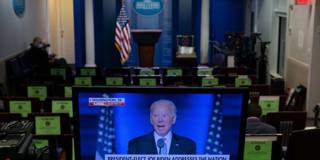Outgoing US President Donald Trump's behavior between now and the inauguration in January of his successor, Joe Biden, is likely to be as obstructionist as his administration was chaotic. Biden should draw two lessons from a previous incumbent US president who didn't handle defeat well.
BERKELEY – Presidential transitions are never easy, especially when they involve an incumbent president defeated at the polls. But this time the transition occurs in the midst of an unprecedented crisis. The incumbent refuses to acknowledge the vote as a rejection of his policies and has a visceral dislike for the president-elect, who he accuses of dishonesty and dismisses as too frail to assume the duties of office. He tars his successor as a socialist, an advocate of policies that will put the country on the road to ruin.
The year was 1932, and the transition from Herbert Hoover to Franklin D. Roosevelt occurred in the midst of an unparalleled economic depression and banking crisis. The outgoing president, Hoover, had an intense aversion to his successor, whose incapacity of concern was not any lack of mental acuity, but rather Roosevelt’s partial paralysis. He called FDR a “chameleon on plaid” and accused him of dealing “from the bottom of the deck.” In his campaign and subsequently, Hoover insinuated that FDR’s socialistic tendencies would put the country on a “march to Moscow.”
Back then, the interregnum lasted four months, during which the lame-duck president and Congress did little if anything to address the ongoing crisis. Bank runs and panics were spreading contagiously, forcing one state governor after another to shut down their banking systems. But Hoover refused to declare a bank holiday unilaterally. By the time FDR was inaugurated in March 1933, the banking system and the entire economy were virtually at a standstill.

BERKELEY – Presidential transitions are never easy, especially when they involve an incumbent president defeated at the polls. But this time the transition occurs in the midst of an unprecedented crisis. The incumbent refuses to acknowledge the vote as a rejection of his policies and has a visceral dislike for the president-elect, who he accuses of dishonesty and dismisses as too frail to assume the duties of office. He tars his successor as a socialist, an advocate of policies that will put the country on the road to ruin.
The year was 1932, and the transition from Herbert Hoover to Franklin D. Roosevelt occurred in the midst of an unparalleled economic depression and banking crisis. The outgoing president, Hoover, had an intense aversion to his successor, whose incapacity of concern was not any lack of mental acuity, but rather Roosevelt’s partial paralysis. He called FDR a “chameleon on plaid” and accused him of dealing “from the bottom of the deck.” In his campaign and subsequently, Hoover insinuated that FDR’s socialistic tendencies would put the country on a “march to Moscow.”
Back then, the interregnum lasted four months, during which the lame-duck president and Congress did little if anything to address the ongoing crisis. Bank runs and panics were spreading contagiously, forcing one state governor after another to shut down their banking systems. But Hoover refused to declare a bank holiday unilaterally. By the time FDR was inaugurated in March 1933, the banking system and the entire economy were virtually at a standstill.